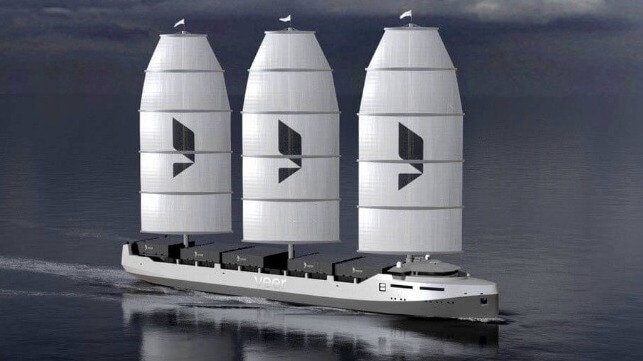Containerships with Sails and Fuel Cells Receive ABS Design Approval

As the maritime industry continues to explore opportunities for wind-assisted propulsion, a start-up company called Veer Corporation reports it has achieved design approval for what could become the first large, wind-powered containerships. Unlike many of the concepts which are smaller ships, Veer plans to combine wind power and hydrogen fuel cells to create larger ships employing sail technology used with large yachts.
Veer is being headed by Danielle Doggett who also started SailCargo, a firm that is building a wind-power cargo ship in Costa Rica using traditional and sustainable methods. The three-masted sailing ship named Ceiba will have a capacity of 250 tons of cargo including nine TEU. The vessel primarily uses sails with backup power from lithium-ion batteries. SailCargo also purchased a historic sailing ship in May 2022 and is currently completing its outfitting to become a sail cargo ship carrying 80 tons of coffee beans and other dry cargo between Columbia and the United States.
The concept for the hybrid vessels to be operated by Veer is larger with a ship designed to carry 160 TEU. Named Mamba, the vessel design seeks to build on the experience of large sail-powered yachts using the naval architects of the Netherland’s Dykstra Naval Architects and the DynaRig sail technology developed by Southern Spars and Magma Structures used on large yachts including the Maltese Falcon and the Black Pearl.
The design concepts for Mamba incorporate a modern, streamlined hull along with three large sails. The vessel would have a capacity of up to 160 TEU. Propulsion will be a hybrid system using the sails along with green hydrogen-powered fuel cells. According to the company, the vessel will able to maintain a speed of 18 knots making it fast and reliable to build commercial cargo opportunities. The vessel would have a range of 1,200 nautical miles.
Veer reports it has received Approval in Principle (AiP) from ABS for the vessel’s design. They are now preparing tender packages and hope to have bids from shipyards by year-end. Veer also reports that it has support from a U.S.-based cosmetics company LUSH, which is exploring using the sailing ship to transport its products.

that matters most
Get the latest maritime news delivered to your inbox daily.
“Receiving this AIP from a recognized organization such as ABS sets Veer apart from other conceptual projects,” says Danielle Doggett, CEO at Veer. “We are making significant progress - you can feel that it’s really happening.”
The company’s plan calls for initially building two of the sailing cargo ships which it expects to put in service by the end of 2024. They report that they will build six vessels for their initial fleet.
